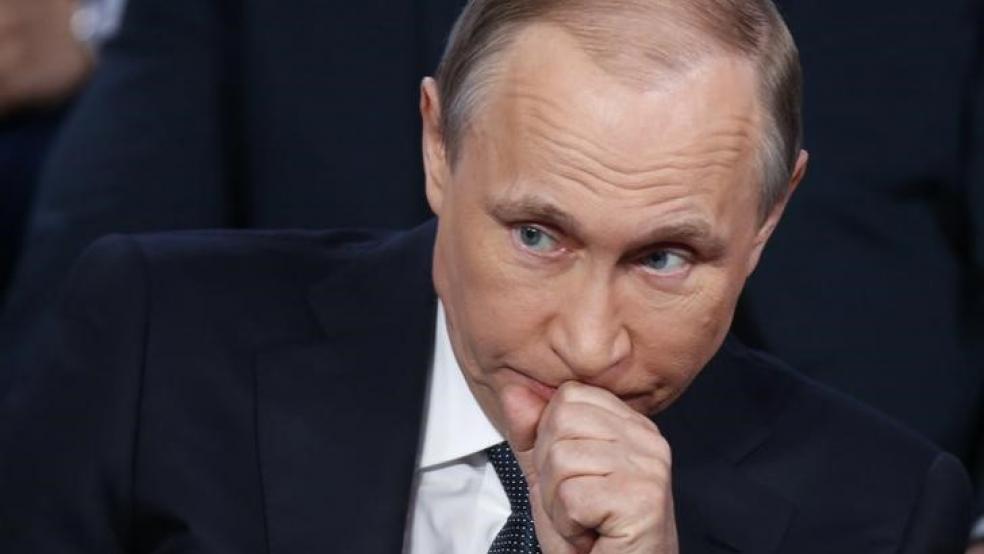As the Democratic Party scrambles to assess the potential impact of another trove of internal documents leaked by the hacking entity calling itself “Guccifer 2.0,” the Democratic National Committee finds itself in a war of words with the Kremlin, whose spokesperson condemned what he called “blatant Russophobia” on display in the US presidential election.
The documents, made available online yesterday, were released along with a rambling statement from the hacker at a security conference in London yesterday. So far, it is unclear whether the massive trove of documents contains any seriously damaging information. As of Wednesday morning, reporters and activists plowing through them had identified information likely to be more annoying than dangerous -- like the personal cell phone numbers of Democratic officials including, apparently, vice presidential nominee Tim Kaine.
Related: Worried About Trump, GOP Donors Back Paul Ryan and His Congressional ‘Firewall’
But the Democratic National Committee took immediate steps to blame Russian “agents” for the hack -- an opinion supported by multiple computer security experts -- and to tie them tightly to Republican presidential nominee Donald Trump.
“The DNC is the victim of a crime—an illegal cyber attack by Russian state-sponsored agents who seek to harm the Democratic Party and progressive groups in an effort to influence the presidential election,” said interim DNC Chair Donna Brazile in a prepared statement. “There’s one person who stands to benefit from these criminal acts, and that’s Donald Trump. Not only has Trump embraced Putin, he publicly encouraged further Russian espionage to help his campaign. Like so many of the words Trump has uttered this election season, his statements encouraging cyber crime are dangerous, divisive, and unprecedented.”
Brazile was referring to Trump’s repeated praise of Russian strongman Vladimir Putin, as well as his offhand suggestion earlier this summer that Russian hackers might be able to access emails that Democratic presidential nominee Hillary Clinton had deleted from her controversial personal email server. In an interview that aired on Russian state-run network RT last week, Trump said that he doubted Russia was actually behind the attacks on the Democratic Party.
An earlier leak of DNC emails revealed that officials with the ostensibly neutral party committee were strong supporters of Clinton during the Democratic primary, enraging supporters of her opponent, Vermont Sen. Bernie Sanders and forcing several resignations. Brazile is serving as interim DNC chair because former chair Debbie Wasserman Schultz was among those forced out by the previous leak.
Related: The Biggest Threat to the Economy? It Could Be the Election
On Tuesday, Brazile warned that whatever turns up in the latest leak might be false information planted by hackers. “Our legal team is now in the process of reviewing these private documents, and attempting to confirm their authenticity, as it is common for Russian hackers to forge documents.”
Russian officials have consistently denied any involvement in the attack on the DNC’s email servers. In an interview with Bloomberg earlier this month, Putin argued that the identity of the DNC hackers is unimportant.
“Listen, does it even matter who hacked this data?” he said. “The important thing is the content that was given to the public.”
However, on Wednesday, in his daily call with reporters, Kremlin spokesman Dimitry Peskov took a more aggressive tone, apparently in response to Brazile’s statement.
Related: Trump -- The Fed Is Conspiring Against Me
“We state that the ‘Russian card’ and the ‘card’ of our president at times becomes the deciding factor in the US electoral process. It would be much nicer if this card played a positive role," Peskov said Wednesday during his daily conference call with reporters. “Unfortunately, we see continued displays of often hard-core Russophobia. We can only express regret in this regard." He added, "This rhetoric, which is being formulated in electoral campaign style... is unlikely to help fledgling, fragile attempts to build at least some sort of mutual trust."
He seemed to be referring to an emerging arrangement between the US and Russia around a ceasefire in Syria, where the two nations have a common foe in the terror group ISIS but are supporting different factions that are also fighting each other.
Russian media also took exception to comments President Obama made while campaigning for Clinton on Tuesday. The president criticized Trump’s praise of Putin’s popularity in Russia and compared him to deceased Iraqi dictator Saddam Hussein.
“Saddam Hussein had a 90 percent poll rating. If you control the media and you've taken away everybody's civil liberties and you jail dissidents, that's what happens,” Obama said.





